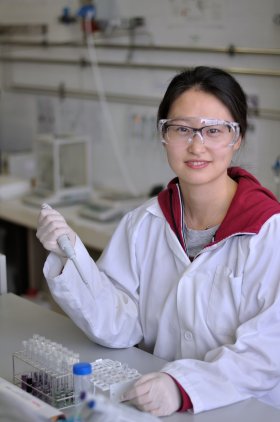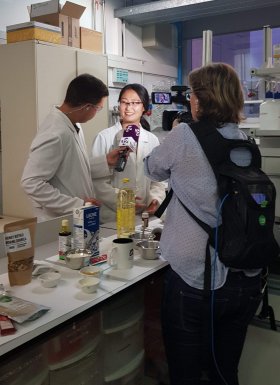Junjing Wang


PhD Programme: Nanoscience, Materials and Chemical Engineering
Research group: FOODIE - Food, Innovation & Engineering
Supervisors: Carme Güell Saperas & Montserrat Ferrando Cogollos
Bio
Junjing Wang obtained the bachelor degree in Food Science and Engineering from Beijing Forestry University in China and subsequently completed the master degree in Food Technology and Nutrition from Lund University in Sweden. During the undergraduate degree study, she was a co-author in one publication entitled “Extraction of polyphenol from chestnut shell and the study on bioactive components inhibiting α-glycosidase” in the journal of Science and Technology of Food Industry. Also, a patent was attained for the implied method. Besides, the degree project “Composition of black sesame oil extracted by scCO2 and its nutraceutical applications” has appeared in the poster presentation of the 6th International Conference of Green and Sustainable Chemistry in Nottingham, UK. Her master thesis was focused on understanding the impact of protein and iso-α-acid on beer lacing property by employing image analysis technique.
Project: Emulsion-based encapsulation systems stabilized with insect proteins: Production with premix microporous emulsification
The focus of the thesis is to produce emulsion-based encapsulation systems using both sustainable ingredients and technologies. Specifically, valorisation of an agri-food by product (carob pulp polyphenol) was proved feasible coupling forward osmosis for concentration and membrane emulsification for encapsulation. Insect powder defatting by solvent extraction was investigated using green solvents (ethanol, isopropanol, and 2-methyltetrahydrofuran), paying special attention to defatting yield and the techno-functional properties of the resulting protein fractions, particularly emulsifying ability. Single and double emulsions stabilised with sustainable protein sources from insects, black soldier fly (Hermetia illucens) and lesser mealworm (Alphitobius diaperinus) larvae, have been successfully produced for the first time by a low-energy high-throughput emulsification technology based on dynamic membranes of tunable pore size (DMTS). H. illucens protein concentrate showed superior ability to stabilize higher lemon oil fraction (40 wt%) compared to whey protein isolate. A commercial polyphenol extract was encapsulated in W1/O/W2 emulsions stabilised with A. diaperinus protein concentrate. These emulsions displayed a comparable stability under freeze-thaw cycles, storage conditions, acidic, and alkaline conditions than the ones stabilized with WPI, and better than the ones stabilized with pea protein. However, they were less able to withstand osmotic pressure differences compared to whey protein. Insect protein stabilized W1/O/W2 emulsions showed less changes in droplet size distribution at the highest temperature tested (90ºC) than the ones stabilized with whey or pea protein, pointing out the benefit of using insect proteins in emulsions that need to undergo heat treatment. Solid microcapsules were successfully produced from refined polyphenol loaded W1/O/W2 emulsions stabilized with insect protein by spray drying or freeze drying. The results demonstrate the insect protein concentrates assessed are a promising sustainable ingredient to replace diary and plant proteins in the emulsion-based encapsulation systems.
Open Access publications
- Junjing Wang, Andrea Martínez-Hernández, Sílvia de Lamo-Castellví, Maria-Paz Romero, Wael Kaade, Montse Ferrando, Carme Güell. Low-energy membrane-based processes to concentrate and encapsulate polyphenols from carob pulp, Journal of Food Engineering, Volume 281, 2020, 109996. View full-text
- Wang, Junjing; Jousse, Morane; Jayakumar, Jitesh; Fernández-Arteaga, Alejandro; de Lamo-Castellví, Silvia; Ferrando, Montserrat; Güell, Carme. 2021. "Black Soldier Fly (Hermetia illucens) Protein Concentrates as a Sustainable Source to Stabilize O/W Emulsions Produced by a Low-Energy High-Throughput Emulsification Technology". Foods 10, no. 5: 1048. View full-text
- García-Gutiérrez, N.; Mellado-Carretero, J.; Bengoa, C.; Salvador, A.; Sanz, T.; Wang, J.; Ferrando, M.; Güell, C.; de Lamo-Castellví, S. Atr-ftir spectroscopy combined with multivariate analysis successfully discriminates raw doughs and baked 3d-printed snacks enriched with edible insect powder. Foods, 10, no. 8. View full-text
- Wang, Junjing, Aurélie Ballon, Karin Schroën, Sílvia de Lamo-Castellví, Montserrat Ferrando, and Carme Güell. 2021. "Polyphenol Loaded W1/O/W2 Emulsions Stabilized with Lesser Mealworm (Alphitobius diaperinus) Protein Concentrate Produced by Membrane Emulsification: Stability under Simulated Storage, Process, and Digestion Conditions" Foods 10, no. 12: 2997. View full-text
- PHD THESIS: Emulsion-based encapsulation systems stabilized with insect proteins: Production with premix microporous emulsification
International secondment
- Wageningen University, the Netherlands. 3 months (2020-2021).
Outreach activities
- European Researchers' Night 2019: "Insectes, els nous ingredients del futur".
News
- Diari Digital de la URV. Interview: After my PhD I would like to keep working on sustainability and innovation
- Diari Digital de la URV. News: Researchers point out the feasibility of using black soldier fly protein in the food industry
- Diari Digital de la URV. News: El grupo de investigación Food Innovation & Engineering participará a la feria «Investigación en Directo» 2019



